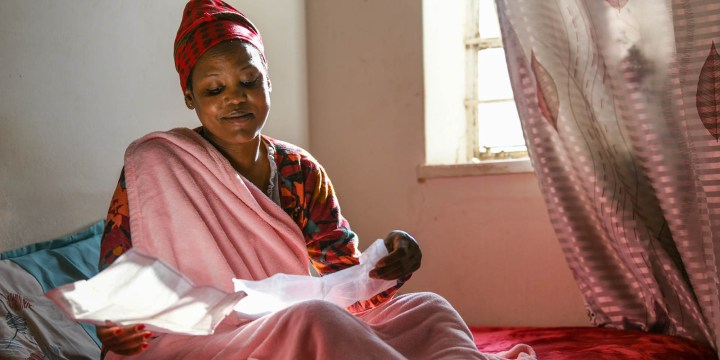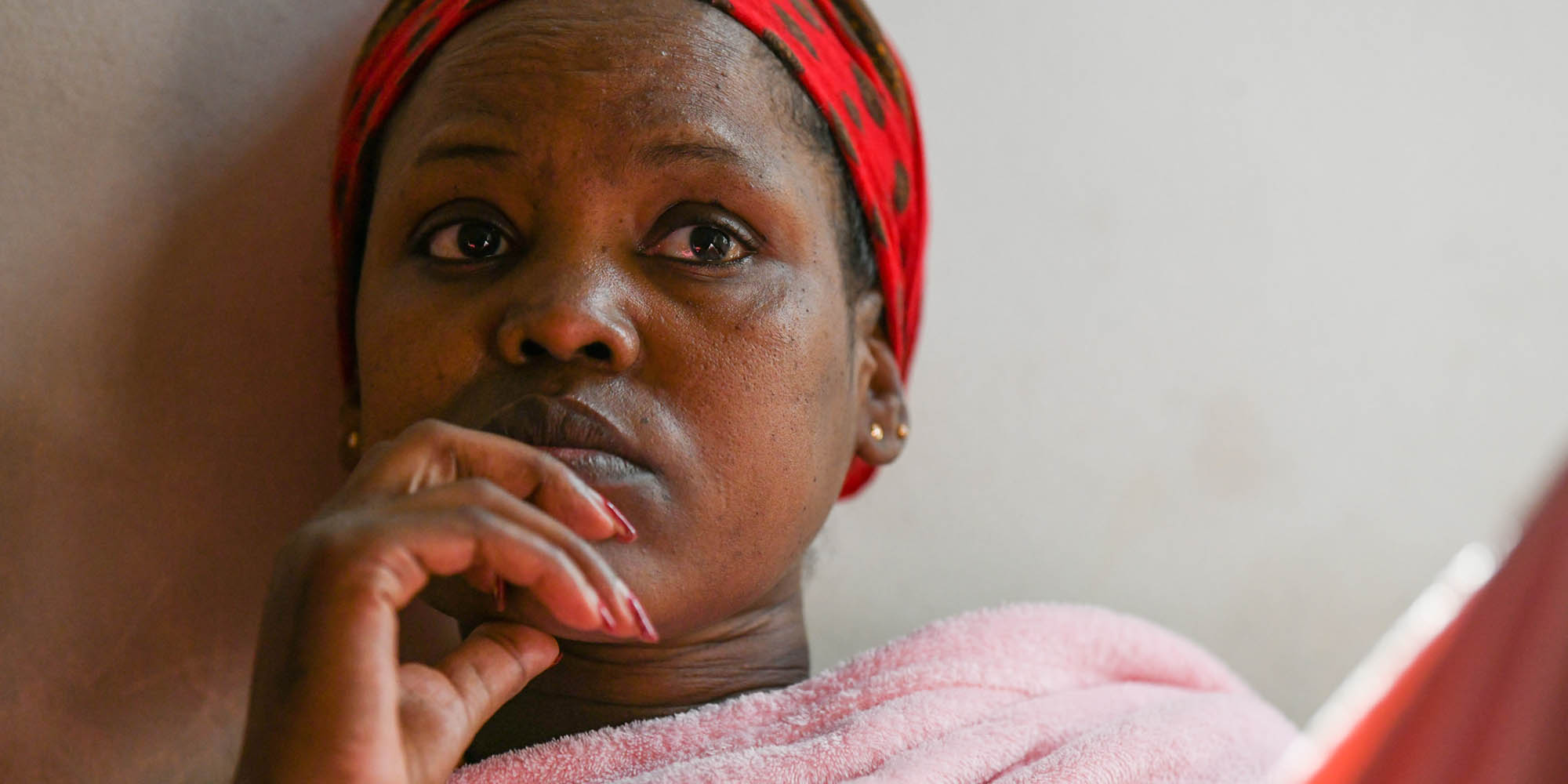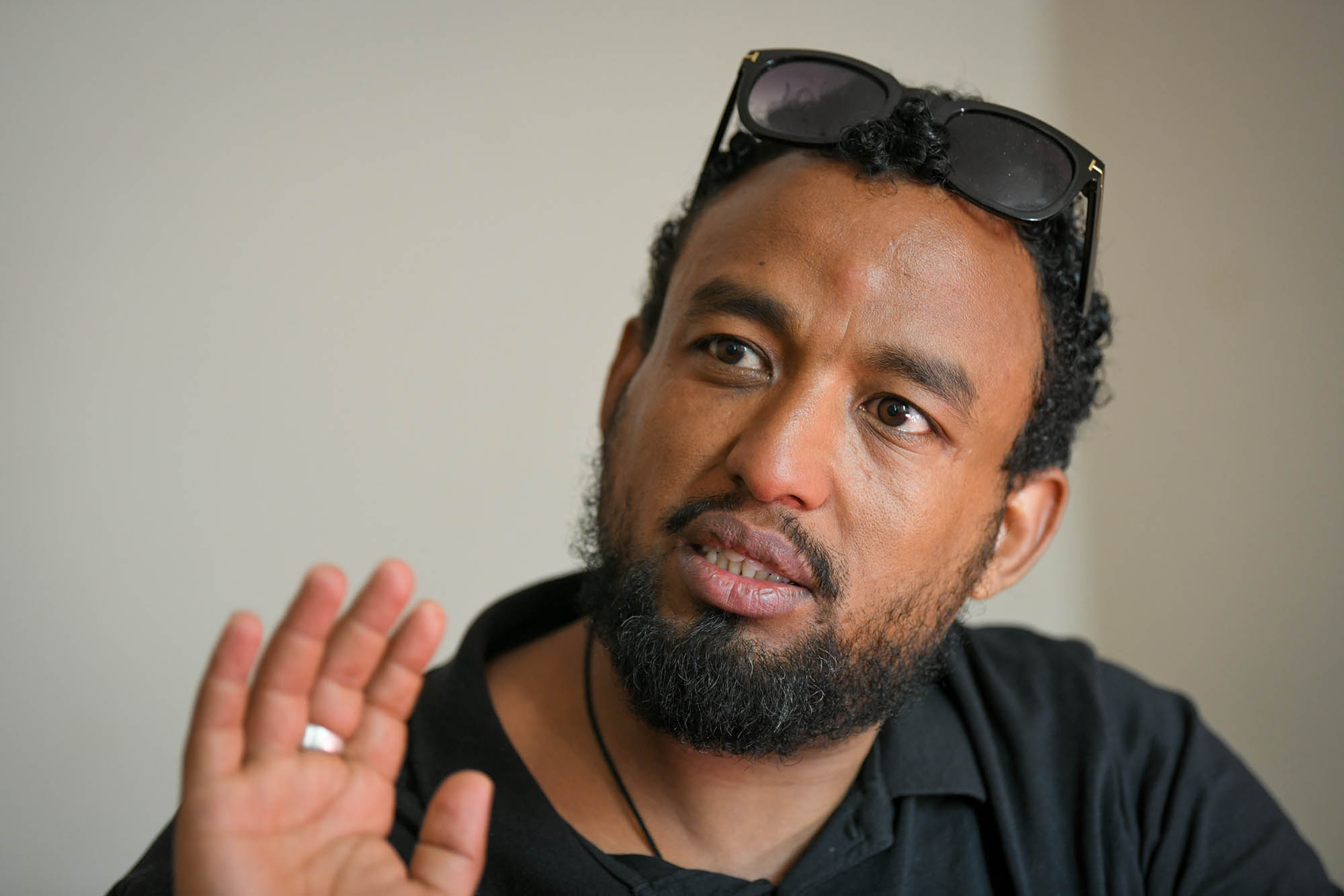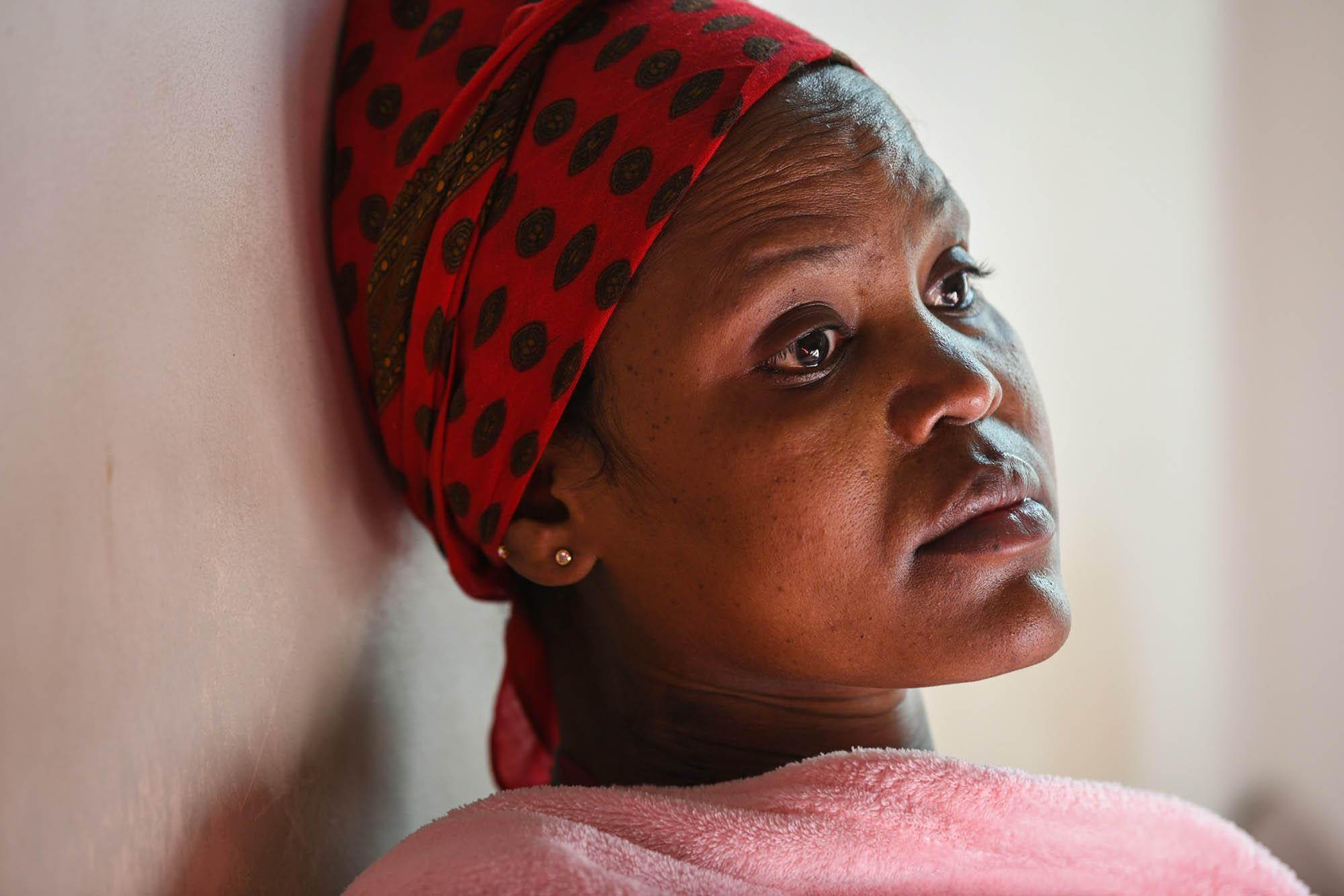Maverick Citizen
When a piece of paper stands between living and dying

Alem Ereselo is gravely ill and in need of life-saving dialysis. Her kidneys are failing and she should be on a transplant waiting list. But she has been denied further dialysis by the South African government – because of her asylum-seeker status.

Alem Ereselo is an Ethiopian asylum seeker who has been denied renal treatment by South African medical authorities backed by a supporting judgement made by the Johannesburg High Court. She requires dialysis in order to survive before a kidney replacement becomes available, 16 November 2019. (Photo: Chris Collingridge)
Hope vanished fast the year Alem Ereselo was 23 years old. She was not going to be able to continue with her training in tourism and hospitality. Even the drudge job she had as cleaner, helping to support her family and her studies, would have to come to an end.
The year was 2009 and Ereselo and one of her brothers were to leave their home in Addis Ababa, the capital city of Ethiopia. They had to strike out for a better life in South Africa and leave behind their three siblings and their parents. Staying was becoming an increasingly bad idea.

Dawit Assdome, a friend and fellow Ethiopian has done his best to aid Alem Ereselo in her attempts to receive medical help. Alem Ereselo is an Ethiopian asylum seeker who has been denied renal treatment by South African medical authorities backed by a supporting judgement made by the Johannesburg High Court. She requires dialysis in order to survive before a kidney replacement becomes available. 16 November 2019. (Photo: Chris Collingridge)
“The economy was bad, also the politics. The government soldiers wanted people to join the army,” says Dawit Assdome. He calls himself her brother and translates for Ereselo from their native Amharic into English. He’s lived in South Africa for 19 years.
“Our story, for all of us, is the same when we have to flee. You take nothing with you; you take whatever transport you can get. First, we go to Moyale (a town south of the capital) – it’s one day by truck, then there you cross into Kenya. But Kenya is still too close, they can still get you, so you must try come to South Africa,” he says.
Ereselo and her brother did manage to find their way down the continent, bit by bit, until they passed into South Africa. They made their way to Durban and applied for asylum status in March 2010 at a refugee reception station.
As the months turned into years the siblings moved up to Joburg, settling in Mayfair. Ereselo had run a small grocery store in Durban and in Joburg was selling clothes in “Little Addis”, the few streets surrounding the blue-glassed skyscraper in Jeppe Street that’s come to be known as the Ethiopian Quarter.
Human Rights Watch’s 2009 report outlines the life Ethiopian citizens were facing at the time Ereselo and her family were forced to make plans to flee.
The report reads: “The Ethiopian government’s human rights record remains poor, marked by an ever-hardening intolerance towards meaningful political dissent or independent criticism. Ethiopian military forces have continued to commit war crimes and other serious abuses with impunity in the course of counterinsurgency campaigns in Ethiopia’s eastern Somali region and in neighbouring Somalia.
“In 2008 the government launched a direct assault on civil society by introducing legislation that would criminalise most independent human rights work and subject NGOs to pervasive interference and control.”
Ereselo has not been back to Ethiopia and is still living in South Africa under asylum-seeker status. She brings out the document from her handbag. It’s a folded A4 document she keeps inside a plastic folder. It gives her birth year as 1975, but that’s an error, Assdome says – the kind of error migrants are used to when information is lost in translation and lost in careless data capturing.
She spreads the paper flat on the bed she’s sitting on. In a matter of days, she’ll be required to renew the document that Refugee Reception Offices only validate for six months at a time.
It’s been the same back-and-forth story for the nearly 10 years that she’s lived in South Africa. But this time she doesn’t know if she’ll be able to physically make it to Pretoria to renew her papers.

Alem Ereselo is an Ethiopian asylum seeker who has been denied renal treatment by South African medical authorities backed by a supporting judgement made by the Johannesburg High Court. She requires dialysis in order to survive before a kidney replacement becomes available. 16 November 2019. (Photo: Chris Collingridge)
Ereselo is gravely ill and in need of life-saving dialysis. Her kidneys are no longer functioning properly and she is at end-stage kidney failure – she needs dialysis to live and she needs to be put on a transplant list. But she has been denied further dialysis by the South African government –all because of the piece of paper on her bed.
She was told earlier this year at Helen Joseph Hospital that, as an asylum seeker, she would not be allowed to continue with dialysis treatment at the facility. She would also not be put on any transplant waiting list.
Lawyers for Human Rights (LHR) took up her case in April, about four months after Ereselo’s illness was diagnosed, but the Johannesburg High Court ruled in October in support of the hospital.
“They let her go to die,” Assdome says. He moved her in with his family in their flat in Yeoville so she can be better cared for. On bad days she’s tired and has no appetite or is vomiting and can’t get out of bed.
“She is not my sister by blood; we are in the same church and in South Africa we are all family,” says Assdome.
The curtains are drawn in the room. It’s a hot Saturday on the afternoon she and Assdome meet Maverick Citizen, but she has a fluffy pink fleece blanket pulled up under her chin. There’s a tremor, and when she speaks the words seemed squeezed out from an exhausted body.
Sometimes she shakes her head in resignation or runs her hands over her face when she speaks. Her cherry-red fake nails are growing out but her attention has not been focused here for months.
Stop-start dialysis treatment in the last few months has left her coughing up blood; water on the lungs has landed her in an ICU. She was supposed to be admitted to ICU for five days of acute dialysis but was only afforded one day’s emergency treatment.
She’s been to about six different facilities – a mix of private and public facilities funded by donations from an LHR campaign that has been covered by overseas media. Some facilities have been able to offer elements of care she needs but have not been able to deal with complications. Others have flat out turned her away and, worse perhaps, are the staff who have been rude, dismissive and dehumanising.
“I have seen it myself because I was with Alem in hospitals – some of the nurses they don’t want to help. They will call me and say you come and wash your sister or feed her but they are not like this to other patients.
“It’s is always about the paper,” says Assdome, referring to the asylum-seeker document that marks them for something different, something second class, something less worthy.
Assdome himself, after 19 years, is still living with asylum-seeker status in South Africa. There is still no outcome to his application for refugee status. The Department of Home Affairs’ long delays in processing these cases means someone like Ereselo is left in a nightmarish twilight zone. She has little protection and rights and limited access to basic services. Refugee status, in contrast, would compel the South Africa government, under the UN Convention of 1951, to grant rights, protection and services to refugees.
“South Africa doesn’t want us to have basic things so we can be human beings,” he says.
Ereselo’s ringing phone disrupts the conversation. The ringtone is from an Ethiopian gospel singer, Ereselo explains, Googling him. While her phone is out, she shows pictures of her mom back in Ethiopia. There’s also one of her – in a crisp white pants suit, with matching white button earrings. She beams for the camera. Propped up on her bed, she barely resembles the person in the photo. Ereselo’s sister has known since the beginning of the year about the seriousness of her condition. They kept it from their mother though till about a month ago.
“Sometimes when they phone her, they can’t even speak, they are just crying,” says Assdome of the anxiety, the heartache that stretches from Yeoville to the horn of Africa.
LHR will challenge the constitutionality of sections of the National Health Act and policies that deny asylum seekers access to dialysis and transplants.
“We will continue with supporting her in a fundraising campaign pending the constitutional challenge,” says Jessica Lawrence, an attorney with LHR.
Lawrence has come to know Alem these past few months. Sometimes she’s played medical officer more than lawyer, but also fundraiser, family spokesperson and friend.
“I think Alem has been very brave. She left a country that was persecuting her and came down to South Africa with nothing. She managed to support herself and to run a small store. All these years she’s asked nothing of the South African government. But now that she’s falling ill they are denying her treatment,” says Lawrence.
Lawrence says LHR’s advocacy on the case is also advocacy to raise the alarm about the scarcity of resources in the public health sector for the likes of dialysis treatment – even for South Africa citizens.
She says the case has been watched by medical professionals and some have used the October court ruling to deny asylum seekers treatment in their facilities.
“It’s unlawful, unconstitutional and an incorrect interpretation of the judgment,” she declares.
Lawrence says hospital policies are discretionary, they guide doctors in decision making, especially in a time of scarce resources and greater need. But she says questions need to be raised about how it is that the doctors’ Hippocratic oath to care and treat has been trumped by a pursuit to execute policy.
Back in the Yeoville flat, Assdome’s six-year-old son Jonathan calls for his dad from the passage. He speaks in English with a South African accent. He runs into Ereselo’s room to hug and greet. He’s South African-born, but his papers don’t say that, Assdome says, shrugging his shoulders.
Outside the window, the streets of Yeoville are noisy with children screaming in play. Saturday afternoon music pumps from other flats and smells of dinner being prepared fill Ereselo’s room. It’s the normal weekend life of an inner-city suburb, only Ereselo knows there’s nothing normal about her situation at all. MC
Photos by Chris Collingridge




















 Become an Insider
Become an Insider